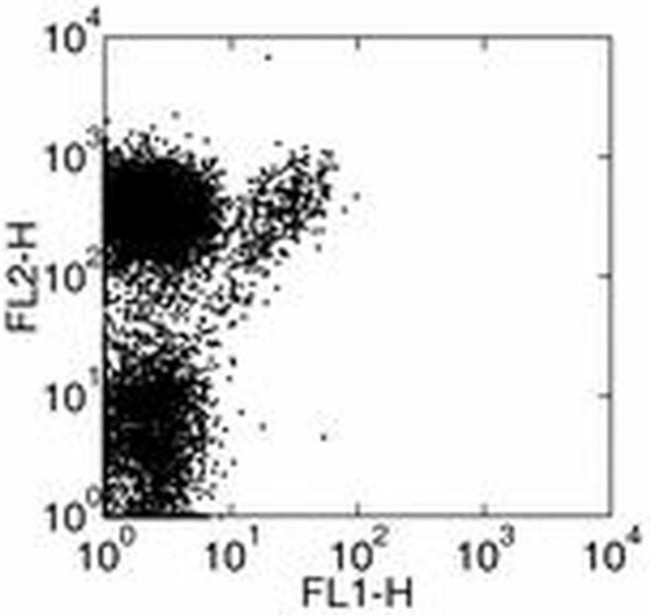Invitrogen
TCR gamma/delta Monoclonal Antibody (UC7-13D5), Functional Grade, eBioscience™
Product Details
16-5811-85
Species Reactivity
Published species
Host/Isotype
Recommended Isotype Control
Class
Type
Clone
Conjugate
Form
Concentration
Purification
Storage buffer
Contains
Storage conditions
Shipping conditions
RRID
Product Specific Information
Description: The UC7-13D5 monoclonal antibody reacts with the mouse gamma delta TCR complex. The gamma delta TCR is expressed by a small subset of T cells in the thymus, peripheral lymphoid tissues, intestinal epithelium, and epidermis. The exact specificity, ligand and function of gamma delta TCR-bearing T cells are not yet fully understood; it is suggested that these cells recognize bacterial ligands and some tumor cells in the context of MHC class I-like gene products and play a role in regulation of the immune response and during bacterial infection.
Applications Reported: UC7-13D5 has been reported for use as a phenotypic marker for gamma delta TCR-expressing T cells and has been reported for use in flow cytometric analysis, in vitro functional studies and in vivo depletion.
Applications Tested: The UC7-13D5 antibody has been tested by flow cytometric analysis of mouse thymocytes and splenocytes and can be used at less than or equal to 0.5 µg per test. A test is defined as the amount (µg) of antibody that will stain a cell sample in a final volume of 100 µL. Cell number should be determined empirically but can range from 10^5 to 10^8 cells/test. It is recommended that the antibody be carefully titrated for optimal performance in the assay of interest.
Storage and handling: Use in a sterile environment.
Filtration: 0.2 µm post-manufacturing filtered.
Purity: Greater than 90%, as determined by SDS-PAGE.
Endotoxin Level: Less than 0.001 ng/µg antibody, as determined by LAL assay.
Aggregation: Less than 10%, as determined by HPLC.
Target Information
TCR gamma/delta (T-cell receptor gamma/delta) are specialized T-cells in the immune system. The ability of T cell receptors (TCR) to discriminate foreign from self-peptides presented by major histocompatibility complex (MHC) class II molecules is essential for an effective adaptive immune response. TCR recognition of self-peptides has been linked to autoimmune disease. Mutant self-peptides have been associated with tumors. Engagement of TCRs by a family of bacterial toxins know as superantigens has been responsible for toxic shock syndrome. Autoantibodies to V beta segments of T cell receptors have been isolated from patients with rheumatoid arthritis (RA) and systemic lupus erythematosus (SLE). The autoantibodies block TH1-mediated inflammatory auto-destructive reactions and are believed to be a method by which the immune system compensates for disease. Most human T cells express the TCR alpha-beta and either CD4 or CD8 molecule (single positive, SP). However, a small number of T cells lack both CD4 and CD8 (double negative, DN). Increased percentages of alpha-beta DN T cells have been identified in some autoimmune and immunodeficiency disorders. Gamma-delta T cells are primarily found within the epithelium. They show less TCR diversity and recognize antigens differently than alpha-beta T cells. Subsets of gamma-delta T cells have shown antitumor and immunoregulatory activity.
For Research Use Only. Not for use in diagnostic procedures. Not for resale without express authorization.
Bioinformatics
Protein Aliases: T3/TCR complex; TCR delta gamma; TCR gamma/delta; TCR-CD3 complex

Performance Guarantee
If an Invitrogen™ antibody doesn't perform as described on our website or datasheet,we'll replace the product at no cost to you, or provide you with a credit for a future purchase.*
Learn more
We're here to help
Get expert recommendations for common problems or connect directly with an on staff expert for technical assistance related to applications, equipment and general product use.
Contact tech support



